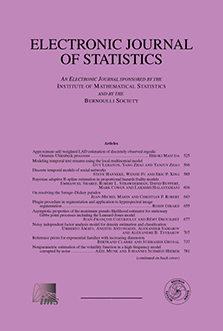Abstract
We present a new finite-sample analysis of M-estimators of locations in a Hilbert space using the tool of the influence function. In particular, we show that the deviations of an M-estimator can be controlled thanks to its influence function (or its score function) and then, we use concentration inequality on M-estimators to investigate the robust estimation of the mean in high dimension in a corrupted setting (adversarial corruption setting) for bounded and unbounded score functions. For a sample of size n and covariance matrix Σ, we attain the minimax speed with probability larger than in a heavy-tailed setting. One of the major advantages of our approach compared to others recently proposed is that our estimator is tractable and fast to compute even in very high dimension with a complexity of where n is the sample size and Σ is the covariance matrix of the inliers and in the code that we make available for this article is tested to be very fast.
Acknowledgments
The author would like to thank Elvezio Ronchetti, for the discussions that gave him the ideas behind this article, and his two Ph.D.-advisors Matthieu Lerasle and Guillaume Lecué for their advice and reviews.
Citation
Timothée Mathieu. "Concentration study of M-estimators using the influence function." Electron. J. Statist. 16 (1) 3695 - 3750, 2022. https://doi.org/10.1214/22-EJS2030
Information





